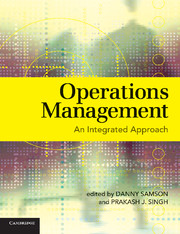Book contents
- Frontmatter
- Contents
- List of Contributors
- Preface
- Acknowledgements
- Part I Operations within Organisations – Building Blocks
- Part II Approaches to Understanding OM
- Part III Moving Forward with OM – Creating Competitive Advantage
- Part IV Challenges and Opportunities in Operations
- Part V Case Studies
- 1 Innovation in the Biotechnology Sector: The Case of IDT Australia
- 2 New Zealand King Salmon: Value-Chain Innovation
- 3 Pilila Clothing Company Goes Lean
- 4 From Singapore to the World: Port Management in Singapore
- 5 Striving for Operations Excellence within Queensland Rail Supply Division
- 6 Should I Stay or Should I Go? Shiraishi Garments Company
- 7 Towards a Green Supply Chain: Toyota Australia
- 8 Process Analyses and Improvement at Bartter Enterprises
- 9 Operations Challenges at Firth Industries Limited, Wellington Division
- 10 Ford Motor Company: Moving Forward in Australia
- 11 Technology Transfer at Hero Honda
- 12 Why Is the Patient Resident Time so Long?: The Case of St Martin's and Charity Private Hospital
- Index
5 - Striving for Operations Excellence within Queensland Rail Supply Division
Published online by Cambridge University Press: 05 June 2012
- Frontmatter
- Contents
- List of Contributors
- Preface
- Acknowledgements
- Part I Operations within Organisations – Building Blocks
- Part II Approaches to Understanding OM
- Part III Moving Forward with OM – Creating Competitive Advantage
- Part IV Challenges and Opportunities in Operations
- Part V Case Studies
- 1 Innovation in the Biotechnology Sector: The Case of IDT Australia
- 2 New Zealand King Salmon: Value-Chain Innovation
- 3 Pilila Clothing Company Goes Lean
- 4 From Singapore to the World: Port Management in Singapore
- 5 Striving for Operations Excellence within Queensland Rail Supply Division
- 6 Should I Stay or Should I Go? Shiraishi Garments Company
- 7 Towards a Green Supply Chain: Toyota Australia
- 8 Process Analyses and Improvement at Bartter Enterprises
- 9 Operations Challenges at Firth Industries Limited, Wellington Division
- 10 Ford Motor Company: Moving Forward in Australia
- 11 Technology Transfer at Hero Honda
- 12 Why Is the Patient Resident Time so Long?: The Case of St Martin's and Charity Private Hospital
- Index
Summary
Queensland Rail (QR)
Queensland Rail (QR) is a $A3 billion a year business, being one of Australia's largest and most modern transport providers operating on more than 20, 000 kilometres of track across Australia. With the acquisition of Australian Railroad Group (ARG) – the largest freight haulier on the western seaboard and currently holds approximately 39 per cent of the national grain freight market and 45 per cent of the minerals rail freight market – it now has a national footprint.
QR is a government-owned corporation (GOC) accountable to its shareholding ministers, the Queensland Treasurer and the Queensland Minister for Transport. The Board is responsible for ensuring the corporation acts in a commercial manner. QR employs over 14,000 people, including those in QR's three subsidiaries. In today's competitive environment, QR, like any other corporation, is being driven by market and social forces, which demand greater services and better value for money.
Shared Services Group – Supply Division
The Supply Division is a part of the Shared Services Group in QR. It provides procurement, contracting, reclamations and disposals, inventory management, business support, accounts payable and fleet management services. Supply deals with approximately 9000 active suppliers who do business with QR each year, spending some $1.15 billion annually for the goods and services they provide.
- Type
- Chapter
- Information
- Operations ManagementAn Integrated Approach, pp. 450 - 472Publisher: Cambridge University PressPrint publication year: 2008



